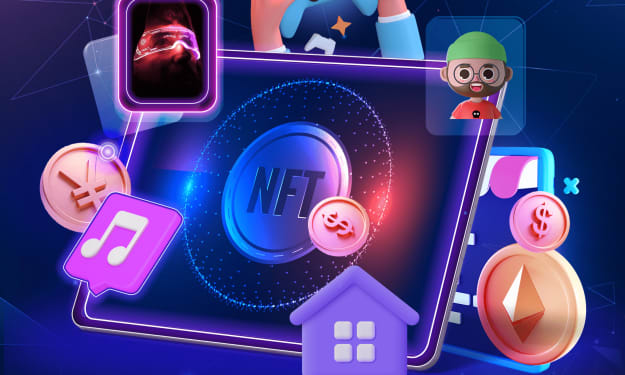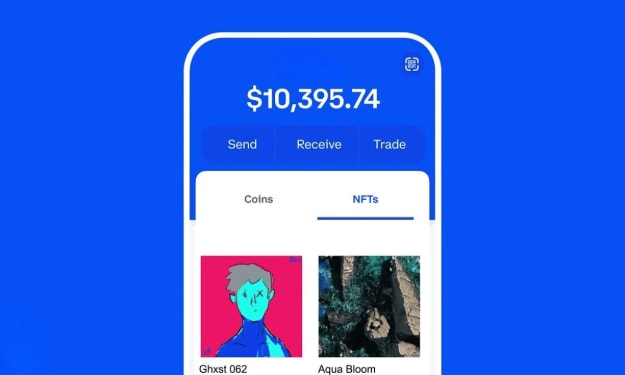Crypto Wallet Development: Build a Secure Digital Wallet for Crypto Assets
Developing a cryptocurrency wallet requires a systematic approach that involves various steps.

Cryptocurrencies have revolutionized the way we perceive and transact with money. With the growing popularity of cryptocurrencies like Bitcoin, Ethereum, and many others, the demand for secure and user-friendly cryptocurrency wallets has also surged. A cryptocurrency wallet is a digital wallet that enables users to securely store, send, and receive cryptocurrencies. In this blog post, we will delve into the intricacies of developing a cryptocurrency wallet, including the cost, the best development companies, and the ideal programming language for the task.
How is a Cryptocurrency Wallet Developed?
Developing a cryptocurrency wallet requires a systematic approach that involves various steps. Let's take a closer look at the typical development process of a cryptocurrency wallet:
Understanding the Requirements
The first step in developing a cryptocurrency wallet is to understand the requirements of the project. This involves defining the purpose, features, and functionalities of the wallet. For instance, the type of cryptocurrency to be supported, the security measures to be implemented, and the user interface design are crucial aspects to consider during this phase.
Choosing the Right Platform
Cryptocurrency wallets can be developed for different platforms, such as desktop, mobile, and web. Each platform has its unique requirements and challenges, and the choice of platform depends on the target audience and the goals of the wallet. For instance, a mobile wallet may require additional security features due to the inherent risks associated with mobile devices.
Designing the User Interface
The user interface (UI) of a cryptocurrency wallet plays a critical role in ensuring a smooth and user-friendly experience. The UI should be intuitive, easy to navigate, and visually appealing. It should also incorporate all the necessary functionalities, such as sending and receiving cryptocurrencies, checking balances, and managing transactions.
Implementing Security Measures
Security is a paramount concern in cryptocurrency wallets, as they store valuable digital assets. Implementing robust security measures is crucial to protect against potential threats, such as hacks and scams. This may include features like multi-factor authentication (MFA), encryption, and secure key management.
Developing the Backend
The backend of a cryptocurrency wallet involves the development of server-side components that handle the processing of transactions, storing and retrieving data, and interacting with the blockchain. The backend should be designed to be scalable, secure, and efficient, to ensure smooth performance and minimize downtime.
Testing and Debugging
Once the cryptocurrency wallet is developed, thorough testing and debugging are essential to identify and fix any bugs or vulnerabilities. This involves rigorous testing of all the functionalities of the wallet, including transaction processing, security features, and user interface elements.
Deployment and Maintenance
After testing and debugging, the cryptocurrency wallet is ready for deployment. This involves making the wallet available for users to download and install on their devices. Additionally, regular maintenance and updates are necessary to ensure the wallet remains secure, up-to-date with the latest security patches, and compatible with the latest blockchain protocols.
How Much Does it Cost to Develop a Cryptocurrency Wallet?
The cost of developing a cryptocurrency wallet can vary significantly depending on various factors, such as the complexity of the project, the features and functionalities required, the platform chosen, and the expertise of the development team.
Development Team
The expertise and experience of the development team play a crucial role in determining the cost of developing a cryptocurrency wallet. Highly skilled and experienced developers may charge higher rates, but they may also deliver a higher quality product.
Features and Functionalities
The features and functionalities required in the cryptocurrency wallet also impact the development cost. Basic wallets with minimal features may be less expensive, while wallets with advanced features like multi-signature support, hardware wallet integration, and decentralized exchange integration may cost more.
Platform
The platform chosen for developing the cryptocurrency wallet also affects the cost. Developing a wallet for a single platform, such as mobile or desktop, may be less expensive compared to developing for multiple platforms or cross-platform compatibility.
Security Measures
Implementing robust security measures, such as multi-factor authentication (MFA) and encryption, adds to the development cost. The level of security required for the wallet, as well as the complexity of the security features, can impact the overall cost.
UI/UX Design
The complexity and quality of the user interface and user experience (UI/UX) design also affect the development cost. A simple and basic UI/UX may be less expensive compared to a complex and visually appealing design that requires more effort and expertise.
Testing and Debugging
Rigorous testing and debugging are crucial for ensuring the security and functionality of the cryptocurrency wallet. The cost of testing and debugging depends on the scope and complexity of the wallet, as well as the level of testing required.
Maintenance and Updates
Regular maintenance and updates are necessary to keep the cryptocurrency wallet secure and up-to-date with the latest blockchain protocols. The cost of maintenance and updates should also be considered in the overall development cost.
Considering these factors, the cost of developing a cryptocurrency wallet can range from a few thousand dollars to tens of thousands of dollars or more, depending on the complexity and requirements of the project.
Which is the Best Cryptocurrency Wallet Development Company?
There are numerous cryptocurrency wallet development companies in the market, and choosing the best one can be a challenging task. Here are some factors to consider when selecting a cryptocurrency wallet development company:
Expertise and Experience
Look for a development company with a team of skilled and experienced developers who have expertise in developing cryptocurrency wallets. Check their portfolio and track record to ensure they have successfully delivered similar projects in the past.
Security Measures
Cryptocurrency wallets require robust security measures to protect the digital assets of users. Ensure that the development company has a strong focus on security and follows best practices, such as encryption, multi-factor authentication (MFA), and secure key management.
Customization and Flexibility
The development company should offer customization options and flexibility in developing the cryptocurrency wallet according to your specific requirements. They should be able to adapt to different platforms, features, and functionalities, and provide a tailored solution that aligns with your business goals.
UI/UX Design
The user interface and user experience (UI/UX) of the cryptocurrency wallet are crucial for ensuring a smooth and user-friendly experience. Look for a development company that emphasizes UI/UX design and can create visually appealing and intuitive wallets.
Testing and Support
Thorough testing and ongoing support are essential for maintaining the security and functionality of the cryptocurrency wallet. Ensure that the development company has a comprehensive testing process in place and offers reliable support services, including regular maintenance and updates.
Reputation and Reviews
Research the reputation and reviews of the development company to gauge their credibility and reliability. Look for testimonials, reviews, and ratings from their past clients to get an idea of their performance and customer satisfaction.
Based on these factors, some of the reputed cryptocurrency wallet development companies in the market include Coinbase, Ledger, Trezor, Mycelium, and Exodus, among others. However, it's important to thoroughly research and evaluate the options based on your specific requirements and budget to choose the best development company for your cryptocurrency wallet project.
What Language to Develop a Cryptocurrency Wallet?
The choice of programming language for developing a cryptocurrency wallet depends on various factors, such as the platform chosen, the features and functionalities required, and the expertise of the development team. Here are some commonly used programming languages for developing cryptocurrency wallets:
Java:
Java is a popular and widely used programming language for developing cryptocurrency wallets, especially for Android-based mobile wallets. It offers platform independence, scalability, and robustness, making it suitable for developing secure and efficient wallets.
C++
C++ is another popular programming language used for developing cryptocurrency wallets. It is known for its performance and efficiency, making it suitable for wallets that require complex computations and high-speed transaction processing. C++ is also commonly used for developing hardware wallets.
Python
Python is a versatile programming language that is gaining popularity in the cryptocurrency development community. It offers simplicity and readability, making it ideal for rapid prototyping and development of wallets with a focus on user interface and user experience. Python is commonly used for developing web-based wallets and for building blockchain applications.
JavaScript
JavaScript is a widely used programming language for developing web-based cryptocurrency wallets. It is commonly used for front-end development and can be used in combination with other back-end technologies to create interactive and user-friendly wallets that run in web browsers.
Solidity
Solidity is a specialized programming language used for developing smart contracts on the Ethereum blockchain. If you are developing a wallet specifically for Ethereum or other Ethereum-based tokens, Solidity may be a suitable choice for implementing smart contract functionalities.
Others
There are other programming languages such as Go, Rust, and Swift that are also used for developing cryptocurrency wallets, depending on the specific requirements and preferences of the development team.
The choice of programming language ultimately depends on the requirements of the cryptocurrency wallet and the expertise of the development team. It is important to choose a language that is secure, efficient, and suitable for the specific platform and functionalities of the wallet.
Conclusion
Developing a cryptocurrency wallet requires careful consideration of various factors, including the technology stack, security measures, platform, UI/UX design, testing, and ongoing maintenance. The cost of developing a cryptocurrency wallet can vary depending on these factors and can range from a few thousand dollars to tens of thousands of dollars or more.
When choosing a cryptocurrency wallet development company, it is essential to consider their expertise, experience, security measures, customization options, UI/UX design, testing, support, reputation, and reviews. Some of the reputed cryptocurrency wallet development companies in the market include Coinbase, Ledger, Trezor, Mycelium, and Exodus, among others.
The choice of programming language for developing a cryptocurrency wallet depends on various factors, such as the platform, features, functionalities, and expertise of the development team. Commonly used programming languages for developing cryptocurrency wallets include Java, C++, Python, JavaScript, Solidity, and others.





Comments
There are no comments for this story
Be the first to respond and start the conversation.